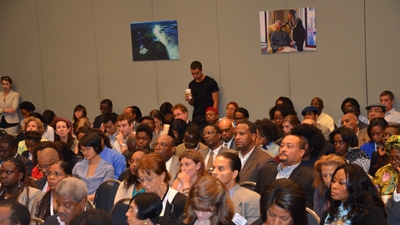December 12, 2012, Washington, D.C. – During the recent Congressional Black Caucus (CBC) Legislative Week September 19 – 22, 2012, the focus was on two philosophical and emotional themes of the African Diaspora; development and identity. Development issues included economics, education, gender, health, youth and how to support Africa. Identity discussions centered on the millions of people throughout the world who now identify as African Diaspora - 42 million African Americans, 115 million Afro-Latinos (including 90 million Brazilians), 23 million Afro-Caribbeans, eight million Afro-Europeans, 800,000 Afro-Canadians and 300,000 Afro-Asians – and how they relate to Africa and the African community of their ancestors.
Since the April 2005 declaration of the African Union Executive Council that “the African Diaspora consists of peoples of African origin living outside the continent, irrespective of their citizenship and nationality and who are willing to contribute to the development of the Continent and the building of the African Union,” many people of African descent have increasingly claimed their identity as African Diaspora and seek to find which communities their ancestors came from. The U.S. Congressional Black Caucus is one of the visible groups that have taken the issue of their African identify and the development of Africa very seriously.
The development and identity themes also defined the Constituency for Africa’s (CFA) Ron Brown African Affairs Series, which also took place during the CBC Legislative Week, with sessions complimentary to those of CBC. One of the crowning sessions during the CBC Legislative Week was African Foreign Affairs Braintrust, “Africa Rising: A Continent of Opportunity.” Makhtar Diop, the World Bank’s Vice President for Africa, was one of three panelists discussing the theme “Africa’s Growing Economies.” He was joined by Ambassador Tebelelo Seretse of Botswana and Jay Ireland, CEO of GE Africa.
Some key issues in Diop’s presentation were about Africa’s rapid growth and poverty reduction since the late 1990s. Diop said that Africa’s average growth has exceeded five percent per year and accelerated to six percent before the global economic crisis. Performance of the 22 non-oil exporting countries averaged higher than four percent annual growth for the decade 1998 to 2008, all of which he attributed mainly to better macroeconomic policies.
Pointing out Africa’s challenges, Diop emphasized the importance of “access to electricity in Africa, which is essential to achieve the Millennium Development Goals and promote inclusive growth and job creation, support businesses and productivity. He called on the diaspora and the private sector to collaborate in finding investments for Africa’s power. The World Bank Continues to leverage IDA resources, global knowledge and private sector finance and expertise to improve access to and delivery of basic services of which electricity is one, in keeping with the Goal 8 of the Millennium Development Goals (MDGs). The African Diaspora is a natural partner in this regard.
During a Lunch and Cultural Presentation session, Congresswoman Karen Bass, the host of Africa Braintrust program, authorized an announcement of her genealogical test results, taken to determine her ancestry. Gina Paige, President of African Ancestry, made the announcement. The test revealed that Rep. Bass is a descendant of Cameroon, and would therefore be more specifically known as an “AmeriCam” even as she remains an African American.
The Cameroonian Ambassador was on hand to perform a quick, traditional welcoming ceremony for Rep. Bass, involving the gift of a piece of African cloth and DVDs about Cameroon, pending an official ceremony later that will include issuing her a Cameroonian passport. Rep. Bass said she was looking forward to learning about Cameroon and “to going home.”
There was no dry eye in the room when a video about an emotional return to Cameroon of a group of African Americans/AmeriCams was played. The group of more than 10 included actor Isaiah Washington, actress Sheryl Lee Ralph and many others.
Several members of Congress have taken ancestry tests, including Rep. Bobby Rush, identified as a Ghanaian, former Congresswoman Diane Watson (Central African Republic), and Rep. Barbara Lee (Sierra Leone). Watson emphasized the importance of “knowing where you are from, for health reasons, as this should guide how you eat.”
Paula Madison, co-owner of The Africa Channel insightfully declared, “We are not defined by slavery.” She said how the Chinese side of her ancestry embraced her lovingly when she went to meet them recently after discovering that she is Chinese and Ghanaian, while the Ashante Hene, the King of her Ghanaian heritage, personally gave her a Ghanaian name.
Madison said that, “the belief out there that Africans don’t accept African Americans is just something in the winds without basis.”
In a candid moment while greeting the participants, Democratic Whip Steny Hoyer said, “no group of Americans has taken as much abuse as the African Americans and none has remained as loyal.” That was a proud moment for many in the room.

